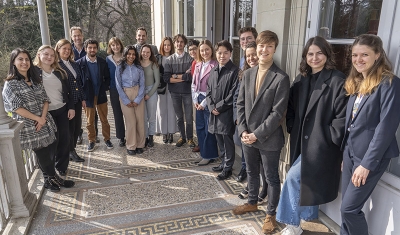Launch Event: Joint Initiative on the Digitalization of Conflict
Event


Comfreak/Pixabay
This panel discussion marks the Launch of our New Research Initiative, which will be carried out jointly by our former Swiss IHL Chair Robin Geiß and the International Committee of the Red Cross (ICRC).
Digital technologies are set to revolutionize the ways wars are fought. Technological advances in the fields of cyberspace and artificial intelligence will have far-reaching and not yet fully understood consequences for future humanitarian protection needs and the humanitarian legal framework at large.
Against this backdrop, our panelists will explore and discuss the rapidly evolving digitalization of armed conflicts.
Moderator
- Gloria Gaggioli, Director, Geneva Academy and Associate Professor, University of Geneva
Panelists
- Robin Geiß, Swiss IHL Chair, Geneva Academy and Professor of International Law and Security, University of Glasgow
- Laurent Gisel, Head of the Arms and Conduct of Hostilities Unit, Legal Division, ICRC
- Chelsey Slack, Deputy Head, Cyber Defence Section Emerging Security Challenges Division, NATO Headquarters
- Kerstin Vignard, Head, UNIDIR Support Team to General Assembly processes pursuant to resolutions 73/27 and 73/266
Online
This event will take online on the platform Zoom.
Registration
To follow the event online, register here. After registering, you will receive a confirmation email containing information about joining the webinar.
Asking Questions to Panelists
Please use the Zoom chat function to ask your questions, the moderator will make a selection of questions at the end of the presentations. There will be no possibility to interact by webcam and microphone in order to avoid connection issues.
Video
Launch Event: Joint Initiative on the Digitalization of Conflict
Digital technologies are set to revolutionize the ways wars are fought. Technological advances in the fields of cyberspace and artificial intelligence will have far-reaching and not yet fully understood consequences for future humanitarian protection needs and the humanitarian legal framework at large. Against this backdrop, our panelists explored and discussed the rapidly evolving digitalization of armed conflicts and presented our new research on this issue.








